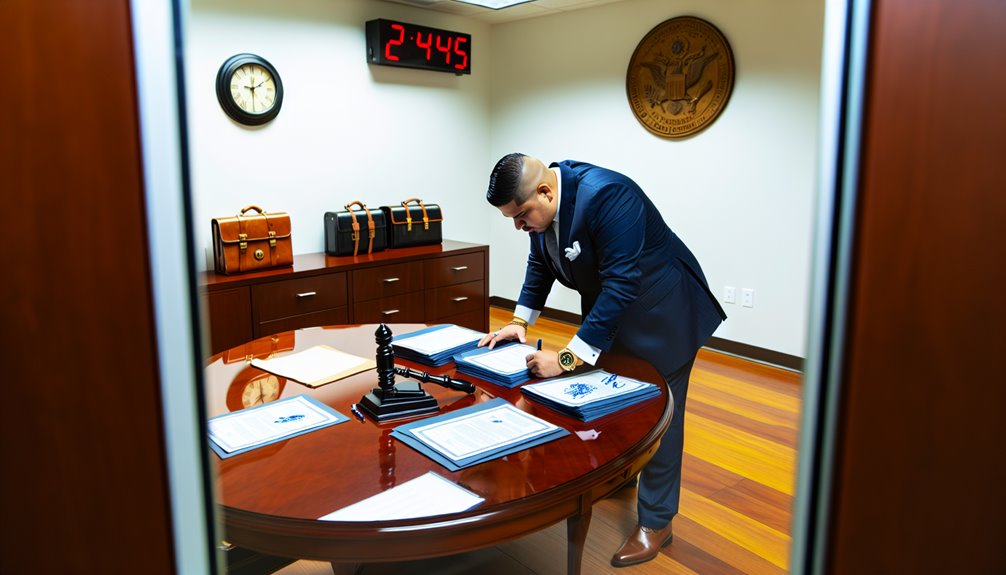A mediated personal injury settlement becomes legally binding when you and all parties sign a written agreement that clearly outlines the terms and conditions. You’ll need proper documentation that includes specific monetary amounts, payment terms, release provisions, and any non-monetary obligations. The agreement must be voluntarily entered, free from fraud or coercion, and comply with your state’s legal requirements. Your mediator will guarantee all necessary forms are completed and properly executed, while maintaining confidentiality throughout the process. A court can then enforce this agreement like any other contract, though you should understand the specific steps needed to protect your settlement’s enforceability.
The Legal Framework of Mediation

While alternative dispute resolution takes many forms, mediation operates within a specific legal framework established by state and federal laws. You’ll find that most jurisdictions have adopted the Uniform Mediation Act (UMA) or similar statutes that govern the mediation process and guarantee its enforceability.
When you participate in mediation, you’re entering a structured negotiation that’s protected by legal safeguards. The legal implications of mediation include confidentiality requirements, which prevent statements made during sessions from being used in court.
You’re also protected by rules regarding mediator neutrality and the voluntary nature of the process.
Your mediation agreement becomes legally binding once both parties sign it, carrying the same weight as a court judgment. You’ll need to ascertain the agreement meets specific legal requirements, including:
- Clear documentation of all terms
- Signatures from all involved parties
- Proper notarization when required
- Compliance with state-specific regulations
- Inclusion of essential contract elements
If you’re considering mediation, you should understand that courts typically won’t enforce agreements that are unconscionable or obtained through fraud, duress, or coercion.
Written Settlement Agreement Requirements
A legally enforceable settlement agreement must adhere to specific requirements that extend beyond basic contract principles.
You’ll need to guarantee your written agreement includes clear identification of all parties, explicit settlement terms, and specific release language that defines the scope of claims being resolved.
Settlement clarity is vital when documenting the exact monetary amount, payment terms, and timeline for disbursement.
You must detail any liens, medical bills, or other obligations that’ll be paid from the settlement funds. The agreement should also specify whether the settlement includes future medical expenses or is limited to existing damages.
Agreement specificity requires you to outline any non-monetary terms, such as confidentiality provisions or non-disparagement clauses.
You’ll want to include language addressing the dismissal of pending litigation and the handling of court costs. The document must also clearly state whether the agreement is a full and final settlement of all claims or if certain rights are reserved.
Make sure all parties sign and date the agreement, and consider having it notarized.
You should also include a statement that all parties have had the opportunity to review the agreement with counsel.
Essential Terms and Conditions

To establish a legally binding settlement agreement in personal injury mediation, you’ll need to incorporate several essential terms and conditions that protect all parties’ interests.
The agreement must clearly specify the settlement amount, payment terms, and release provisions. You’ll also need to include deadlines for payment completion and document execution.
Among the essential components, you must detail the scope of claims being released, including whether future claims are included or excluded.
Your agreement should address confidentiality requirements, non-disparagement clauses, and any specific conditions that must be met before the settlement becomes effective.
When applying negotiation techniques during mediation, make certain you’re documenting all material terms that were discussed and agreed upon.
Include provisions for handling medical liens, insurance subrogation rights, and any outstanding bills related to the injury.
You’ll want to specify the tax implications and responsibility for settlement-related costs.
Don’t forget to address what happens if either party breaches the agreement, including enforcement mechanisms and consequences.
The document should conclude with spaces for all parties’ signatures, dates, and any required witness or notary acknowledgments.
Validity of Mediation Signatures
Before mediation signatures can be deemed legally valid, you’ll need to ascertain proper execution procedures are followed according to your jurisdiction’s requirements.
Signature verification plays an essential role in establishing the authenticity and enforceability of your mediation agreement. To address validity concerns, confirm all parties sign in the presence of authorized witnesses or notaries.
Your mediation agreement’s signatures must meet these fundamental requirements:
- All parties must sign using their legal names, with signatures matching their government-issued identification documents and previous legal signatures on file.
- Each signature must be accompanied by a clearly printed name, date, and time of execution, along with any required witness or notary attestations.
- Electronic signatures must comply with your state’s e-signature laws and utilize approved verification methods.
If you’re using digital signature platforms, confirm they provide audit trails and meet legal standards for authentication.
You’ll need to maintain proper documentation of the signing process, including any video recordings of remote signings or notarizations.
Remember that signature validity can be challenged if proper procedures aren’t followed, potentially invalidating your entire mediation agreement.
Court Recognition and Enforcement

When properly executed, mediated settlements receive strong judicial recognition and enforcement protection under both state and federal laws. You’ll find that courts treat these agreements as binding contracts, enforceable through standard court procedures if either party fails to comply with the terms.
| Enforcement Type | Key Mechanisms |
|---|---|
| Direct Court Order | Judge can convert settlement into court order |
| Motion Practice | Party can file motion to enforce agreement |
| Contempt Powers | Court can impose sanctions for non-compliance |
| Execution Process | Legal process to collect monetary awards |
Once your mediated agreement is finalized, you can file it with the court to obtain a formal judgment. This step transforms your private settlement into an official court order, giving you access to various enforcement mechanisms. If the other party breaches the agreement, you don’t need to file a new lawsuit – you can simply petition the court to enforce the existing settlement through contempt proceedings or execution processes.
Your mediated settlement also benefits from the same enforcement tools available for traditional court judgments, including wage garnishment, property liens, and asset seizure when necessary to guarantee compliance.
Breach of Settlement Consequences
Breaking a mediated settlement agreement carries serious legal and financial repercussions. When you’ve entered into a binding mediation agreement, you’re legally obligated to fulfill its terms.
In settlement disputes, the non-breaching party can pursue various breach remedies through the court system to enforce the agreement or seek compensation.
If you’ve breached a mediated settlement, you’ll likely face these consequences:
- Court-enforced compliance, where a judge can order you to fulfill the terms of the agreement, potentially including monetary penalties for non-compliance.
- Additional legal fees and court costs associated with enforcement proceedings, which you’ll typically be responsible for paying as the breaching party.
- Potential monetary damages beyond the original settlement amount, including interest, attorney’s fees, and compensation for any losses the other party incurred due to your breach.
You should understand that courts treat mediated settlements as binding contracts.
If you’re considering not following through with your settlement obligations, you’ll want to consult with your attorney immediately to understand your options and potential exposure to additional liability.
Mediator’s Role in Documentation

Throughout the mediation process, the mediator plays an essential role in documenting all agreements, discussions, and terms reached between parties. One of the key mediator responsibilities involves maintaining detailed records of each session, including the positions of both parties, proposed settlement terms, and any interim agreements reached during negotiations.
You’ll find that your mediator will document every substantive discussion point to guarantee documentation accuracy and prevent future disputes over what was agreed upon. They’ll prepare the memorandum of understanding, which outlines the final settlement terms, and guarantee that both parties review and approve the document’s contents before signing.
The mediator must also maintain strict confidentiality while documenting sensitive information exchanged during sessions. They’ll record any conditions precedent to settlement, payment terms, release provisions, and specific deadlines for completing agreed-upon actions.
If you’re unsatisfied with any documented terms, you can request clarification or amendments before the agreement becomes final.
Your mediator will also guarantee that all required legal forms are properly completed and that copies of the final documentation are distributed to all parties and their attorneys.
Preserving Confidentiality During Settlement
Three fundamental principles govern confidentiality during personal injury settlement mediations.
You’ll need to guarantee proper implementation of confidentiality agreements and maintain strict privacy protections throughout the entire process. The mediator and all parties must adhere to these legally binding safeguards to preserve the integrity of negotiations and protect sensitive information.
During the settlement process, you should follow these essential confidentiality protocols:
- Don’t share any settlement discussions, offers, or counteroffers with outside parties – this includes social media posts, casual conversations, or any other form of communication that could compromise the mediation’s privacy.
- Sign and maintain thorough confidentiality agreements that clearly outline the scope of privacy expectations, penalties for breaches, and specific protections for medical records, financial details, and personal information.
- Guarantee all documents, electronic communications, and written materials related to the mediation remain secure through proper storage, controlled access, and appropriate destruction methods when necessary.
If you’re unsure about specific confidentiality requirements, you should consult with your legal representative to avoid inadvertent breaches that could jeopardize your settlement or lead to legal complications.
Revoking Mediation Agreements

While revoking a mediation agreement requires careful consideration of legal implications, you can terminate the arrangement under specific circumstances defined by state law and contractual terms.
You’ll need to demonstrate valid grounds for revocation, such as fraud, duress, or material misrepresentation during the mediation process.
To initiate the revocation process, you must submit written notice to all parties involved, including the mediator and opposing counsel.
You’ll typically have a limited window to revoke the agreement, often within 3-7 days after signing. The notice should clearly state your grounds for revocation and reference specific violations of mediation ethics or procedural irregularities.
Before proceeding with revocation, you should consult with your attorney to evaluate potential consequences.
If you’ve already executed settlement documents or the court has approved the agreement, revoking it becomes considerably more challenging.
You’ll need to file a motion with the court explaining why the agreement shouldn’t be enforced.
Remember that courts generally favor upholding mediation agreements, so your grounds for revocation must be substantial and well-documented.
State Laws Governing Settlements
Each state maintains distinct laws and regulations that directly impact personal injury settlements, with notable variations in statutes of limitations, damage caps, and comparative negligence rules.
You’ll need to understand your state’s specific settlement procedures to guarantee compliance and maximize your potential compensation.
State regulations typically govern vital aspects of the settlement process, including mandatory waiting periods, filing requirements, and documentation standards.
You’ll find that some states require court approval for settlements exceeding certain amounts, while others mandate specific forms or disclosures before finalizing agreements.
To navigate your state’s settlement requirements effectively, you should focus on these key areas:
- Documentation requirements, including medical records, witness statements, and proof of damages specific to your jurisdiction
- Mandatory settlement conferences or alternative dispute resolution procedures that your state may require before proceeding to trial
- Filing deadlines and notification requirements for insurance companies, courts, and other involved parties
You must also consider your state’s specific rules regarding structured settlements, contingency fees, and liability thresholds.
These regulations can notably affect your settlement’s timing, amount, and distribution method.
Frequently Asked Questions
How Long Do I Have to Wait Before Receiving My Settlement Money?
After agreeing to a settlement, you’ll typically receive your money within 4-6 weeks, though the settlement timeline can vary.
Your attorney will first process the release forms and handle any liens.
Once the defendant’s insurance company receives signed documents, they’ll issue payment to your lawyer.
After payment processing, your attorney will deduct their fees and expenses, then distribute your portion of the settlement funds to you.
Can I Change Mediators During the Mediation Process?
While mediation thrives on consistency, you can request a change in mediators during the process.
However, you’ll need a valid reason, such as concerns about the mediator’s qualifications or potential conflicts of interest.
To change mediators, you must submit a formal request to the managing authority overseeing your mediation process.
Keep in mind that changing mediators may delay proceedings and require all parties’ agreement, potentially affecting your case’s timeline and dynamics.
What Percentage of Personal Injury Mediations Typically End in Successful Agreements?
You’ll find that personal injury mediations have a significantly high success rate, with approximately 85-90% of cases reaching settlement during or shortly after the mediation process.
While rates can vary by jurisdiction and case complexity, you’re more likely to achieve resolution through mediation than going to trial.
The success rate is particularly high when both parties come prepared, have realistic expectations, and work with experienced mediators who understand personal injury dynamics.
Should I Bring Witnesses or Evidence to the Mediation Session?
Yes, you’ll want to bring relevant evidence to your mediation session, though witness preparation isn’t typically necessary since witnesses don’t usually attend.
You should bring medical records, accident reports, photos, bills, wage loss documentation, and any other supporting materials that strengthen your case.
Your attorney will help organize these materials for effective evidence presentation.
Having this documentation readily available helps facilitate productive negotiations and supports your position during mediation.
Can I Discuss My Mediation Settlement Details on Social Media?
You shouldn’t share your mediation settlement details on social media.
Most settlement agreements include strict confidentiality clauses that legally prevent you from discussing the terms.
Breaking these social media guidelines and settlement confidentiality requirements could result in serious consequences, including nullification of your settlement or financial penalties.
If you’re unsure about what you can share, consult your attorney first or review your settlement agreement’s specific terms.
Conclusion
Making your mediation agreement ironclad requires you to lock down every essential element, much like securing a vault with multiple deadbolts. You’ll need a written settlement document bearing valid signatures, clear terms and conditions, and compliance with your state’s specific laws. Don’t forget that a qualified mediator’s proper documentation serves as your legal shield, while court recognition acts as your final seal of enforceability.

